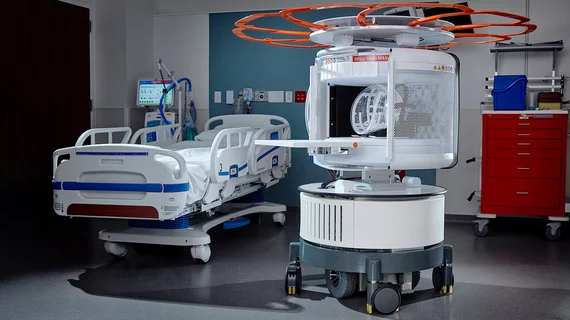Alzheimer’s imaging experts to assess utility, efficiency of Hyperfine’s Swoop system
Is portable MRI suitable for finding abnormalities in the brains of patients receiving amyloid-targeting therapy for Alzheimer’s disease? Clinical researchers are about to find out.
In the observational study—which has already enrolled patients—investigators will focus on the equipment’s prowess at helping physicians find or rule out amyloid-related imaging abnormalities (ARIAs).
Hyperfine, whose Swoop system is the one getting put to the test, says the research is designed to check the technology’s workflow benefits as well as its clinical utility.
Participating Alzheimer’s patients will be imaged at infusion centers and clinics as they receive amyloid-targeting therapy. The infusion and imaging intervals will follow the medication’s FDA-approved labeling, likely before the fifth, seventh and fourteenth infusions, Hyperfine says.
The therapy to be used in the study is surely lecanemab (brand name Leqembi), for which the Japanese pharmaceutical company Eisai and its U.S. partner Biogen received full FDA approval in July 2023. It’s been on the market since January 2023, when the agency granted it an accelerated OK.
ARIA is one of the potential side effects treating physicians must watch for in patients receiving amyloid-busting drugs. FDA requires these patients to receive multiple MRI brain scans during their first year of treatment.
Tammie Benzinger, MD, PhD, will lead the project, which is called CARE PMR for Capturing ARIA Risk Equitably with Portable MR.
“We’ll be evaluating whether portable MR brain imaging can reliably identify brain swelling and bleeding, which have been associated with amyloid-targeting therapies,” says Benzinger, a radiology professor at Washington University in St. Louis and chief of MRI at the school’s Mallinckrodt Institute of Radiology. “This information can help determine whether portable MR imaging—offered at the same time as anti-amyloid infusions—could lessen the inconvenience for patients.”
Hyperfine says Alzheimer’s patients are also being scanned with the Swoop system at Mass General Brigham in Boston. There researchers are obtaining longitudinal data as well as enrolling patients in the CARE PMR protocol, seeking to understand the technology’s full potential role in caring for Alzheimer’s patients.
Hyperfine president and CEO Maria Sainz says the FDA’s traditional approval of lecanemab last summer “represents a major milestone in the global fight against Alzheimer’s, bringing hope of additional years of independent living to patients.”
Sainz adds that Hyperfine looks forward to investigating the Swoop system’s potential as an Alzheimer’s screening tool and “exploring how this accessible and affordable portable MRI modality can help address the challenges of access to care and equity challenges intrinsic to new treatments for this devastating global disease.”

